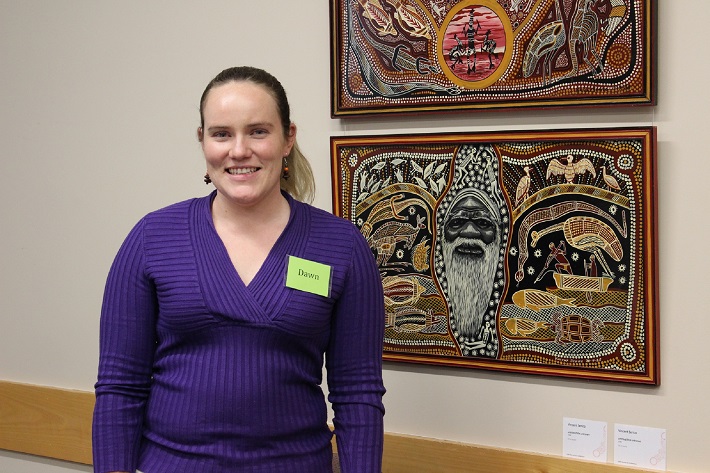Six Indigenous UNE scholars have received training to support their fellow students at university thanks to an innovative peer support program run by the Oorala Aboriginal Centre at the University of New England.
The professional development is part of the Indigenous Scholar/TRACKS Peer Support Program, a Higher Education Participation and Partnership Program (HEPPP) funded initiative which aims to ensure that Australians from low socio-economic backgrounds who have the ability to study have the opportunity to do so.
The program matches academically high-achieving Aboriginal and Torres Strait Islander scholars with students enrolled in the TRACKS tertiary preparation program and involve them in mentoring and peer support activities across Trimester 2. The scholars’ knowledge and experience of tertiary education is a powerful tool which is harnessed to assist those students at the beginning of their university journey.
As part of the professional development, the scholars learn mentoring and public speaking skills as well as how to present themselves in person and through their resume.
One such scholar is Dawn Lewis.
Dawn is a Woolwonga woman from the Northern Territory. Her mum grew up in Batchelor, NT, but chose to raise Dawn and her three sisters in Queensland. She moved to Armidale in 2012.
Reflecting on the professional development she received, Dawn said, “we focused on what it means to be a good mentor – we reflected on the mentors in our own lives and what we needed from them. From an academic perspective we reviewed the gaps in our own knowledge and what we need to be able to help our mentees identify theirs. Ultimately, we learned our actions as mentors will always speak louder than our words.”
While Dawn is a high-achieving student her experience at university has not always been smooth sailing. She admits to being a bit thrown when Program Coordinator and TRACKS Tertiary Preparation Program Academic, Kate Carter, approached her to be a mentor in the program.
“I began at UNE in 2012 and lived at college. I was a terrible student at the time – I didn’t go to class very often and relied on doing my work ‘next week’.
“I bombed hard in my first year, I withdrew from classes I shouldn’t have because I didn’t understand the academic census dates and I didn’t complete units.”
Dawn’s experience is shared by many students who find their first year of study overwhelming and confusing.
Kate invited Dawn to be a mentor in the program as her experience is so similar to that of many other students.
“The Indigenous Scholars/TRACKS Peer Support Program wants to recognise the many high achieving Aboriginal and Torres Strait Islander students at UNE. Often we talk about those students who are having difficulty, and forget that there are many who are not only succeeding, but succeeding at a high level. Dawn’s experience is not an unusual one, and by linking her story with students commencing their tertiary study journey in the TRACKS program allows for real and authentic learning and sharing to take place. Our aim is for TRACKS students to see themselves in Dawn’s experience and know they too can succeed in this space,” Kate said.
Dawn agreed to mentor her fellow students as she believes that it is important for TRACKS students to hear about overcoming academic failure.
“I have bounced back from my failures and I hope my story will help someone persist with their goals when they’re having a tough time.”
“I had many questions when I first began study and didn’t know who to go to for help. I hope my involvement in the program will help TRACKS students overcome some of the barriers they face in higher education.”
Dawn recently completed the requirements for a double degree in Arts and Science, majoring in Archaeology and Genetics, and has begun her Honours year.
Her honours study involves extracting ancient sheep DNA and undertaking a genome wide association study to compare the modern flocks with their ancestors. Dawn hopes that her honours year will guide her in her decision on whether or not to stay in academia.
Congratulations to Dawn and all of the scholars involved in the program.
For more on the Oorala Aboriginal Centre: https://www.une.edu.au/info-for/indigenous-matters/oorala


